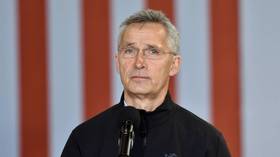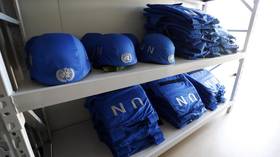NATO talks options but sees no place for own troops in Ukraine

NATO members discussed Ukraine’s pleas to establish a ‘no-fly zone’ over the country, but the alliance is determined not to engage directly in the military confrontation between Moscow and Kiev, Secretary General Jens Stoltenberg said on Friday, after a meeting of foreign ministers of the allies.
“NATO is a defense alliance. Our core task is to keep our 30 nations safe. We are not part of this conflict. And we have a responsibility to ensure it does not escalate and spread beyond Ukraine,” he said. “NATO is not seeking a war with Russia.”
That said, Stoltenberg added, the alliance has stepped up consultations with non-members Sweden and Finland, which are now taking part in all NATO events. It also ramped up support for Georgia and Bosnia and Herzegovina, he said.
The option of a ‘no-fly zone’, which Kiev has been requesting from NATO members, was “mentioned” during the meeting, Stoltenberg said, but member states “agreed that we should not have NATO planes operating over Ukrainian airspace or NATO troops on Ukrainian territory.”
A ‘no-fly zone’ would require NATO to shoot down Russian military aircraft involved in the Ukraine offensive, Stoltenberg pointed out. Russian President Vladimir Putin warned as he announced the invasion last week that any third party trying to intervene in the operation would have consequences “unlike anything they had in their history.” Many Western nations took it as a thinly-veiled threat to use nuclear weapons.
Stoltenberg claimed credit for training and arming tens of thousands of Ukrainian troops over the years, saying this allowed them to fend off the Russian attack now. Putin cited NATO’s creeping expansion into Ukraine as a major reason for ordering the attack in the first place. Russia for years said that dragging its western neighbor into NATO would cross a red line and that Russia would have to respond to what it views as an existential threat to its national security.













